- Home
- Amanda Flower
Verse and Vengeance Page 15
Verse and Vengeance Read online
Page 15
Rainwater opted to remain standing and leaned against the fireplace. My legs were shaking ever so slightly, not enough for anyone to notice other than me, but I didn’t trust them to hold me up anymore, so I perched on the couch next to my grandmother.
She slipped her hand in mine and squeezed my fingers before folding her hands on her lap. “What was it that you want to tell us, Fenimore?”
The troubadour licked his lips. “I just wanted to say I’m sorry to both of you, Daisy and Violet, but to Violet especially. I should have come to you sooner and told you who I am and who I was to Fern. I suppose putting it off year after year was easier, and the longer I waited to tell you, the harder I thought it would be for you to accept who I am.” He pulled his ponytail over his shoulder and tugged on it like it was some kind of comfort to him. “But Violet, when I saw you in the village last year and you looked so much life Fern, I couldn’t stay away. Just like her, you had a presence about you. When you walk into the room, everyone notices, and by some miracle you have no idea that’s happening.”
“That’s true,” Rainwater said.
I looked at him in surprise.
Fenimore let go of his ponytail and sat up a little straighter in his seat. “I know I shouldn’t have waited all these months to speak to you again, but I had to build up the nerve to ask you, and you too, Daisy, one question.”
“What’s that?” Grandma Daisy asked. She was holding my hand again. I hadn’t even noticed that she had moved her hand back.
“Will you forgive me?” His voice was small, not much louder than that of a child asking forgiveness for stealing a cookie from the kitchen.
Grandma Daisy looked to me. It seemed I was the one who had to answer this question.
I felt my shoulders droop. Most of my life I had wondered who my father was, but I had never had the urge to find out. I didn’t know how I could have, since my mother had left his name blank on my birth certificate. I’d put it out of my head until last fall when Fenimore had shown up on my doorstep with a letter. Since then, I had thought of him almost constantly, wondering where he was, whether if I should go and find him. It hadn’t been until I knew I had a father that I realized I had missed having one, not just since seeing Fenimore but my whole life. I had buried that longing so deep that when it was woken up, it pained me.
I stared down at my grandmother’s wrinkled hand over mine once again. She was all the family I had in the world, and Fenimore was giving me an opportunity to have more. I swallowed and looked up and found Rainwater watching me. He smiled at me, and I felt better. I did have other family. I had him, Lacey and Adrien, Sadie, and the Red Inkers. I had this village. Emerson, Faulkner, and this shop. That didn’t mean there wasn’t room for more. There was always room for someone else to love in your life if they will let you; not everyone lets you love them. How could I turn my back on that chance?
I turned to Fenimore, who was staring at his hands. “I forgive you,” I said. There was no quaver of hesitation in my voice. It was strong and clear, and I meant every word of that brief sentence.
He looked at me as if in awe. I knew then that he’d expected my answer to be very different. I couldn’t blame him for that. Months ago when he’d told me who he was, I had refused to believe him. It had been very brave of him to come back at all.
“Thank you, Violet,” he said.
“Good, good,” Grandma Daisy said. “Now that we got that over with, I will make some tea, and we all can have a nice chat.” She smiled at Rainwater. “Have a seat, David. We can’t have you standing in front of the fireplace like a statue.”
Faulkner swooped down from the tree, and Fenimore jumped. The large crow settled next to Rainwater on the hearth. A moment later, Emerson materialized and jumped up next to me. He circled twice before settling himself onto my lap.
“Looks like the whole family is ready for a visit,” my grandmother said cheerfully. “That seems fitting.”
That’s what I thought too.
Chapter Twenty-Seven
The conversation with Fenimore was awkward at first, but it wasn’t long before Grandma Daisy, with her tea and good humor, smoothed everything over. At one point, Emerson jumped off of me and sat on the sofa next to Fenimore. The cat stared at me with his yellow-green eyes as if to tell me everything would be all right. I believed him, if only for that moment.
Fenimore told us about his childhood growing up in Buffalo and how he’d met my mother that fateful summer she got pregnant while he was in the village for a summer job at the height of the tourist season. He smiled at the memory. “Your mother was so self-confident. I think that’s what attracted me to her the most. She told me from the beginning that it would never last. She said she loved me, but her life was such that she couldn’t have love. I was so hurt that at the end of the summer when she told me to leave, I did. I didn’t know she was pregnant. I like to think, had I known, before she died things might have gone a lot differently.”
So differently, I thought. I might not have grown up in Charming Books, I realized as I looked around the store. After my mother died, my father would have been within his rights to have me live with him. I would not have been there when my best friend Colleen died when we were seventeen. That was hard to fathom. Second only to my mother’s death, Colleen’s death had been the most life-changing event in my life. It made me run away from the village and stay away for twelve years until Grandma Daisy tricked me into coming back.
I’ve learned that death changes you like nothing else can. It doesn’t matter if it’s a long demise like my mother’s or a split second like Colleen’s passing. If you are the one left behind, you either come out better having survived it or worse. There is no in between.
Fenimore stood, opened the worn guitar case, and placed his guitar inside it. “It is late, and I need to be going back to Niagara Falls tonight. With all the festivities over in the village, it’s best if I move on to the next place.”
I felt my heart constrict. There were so many more questions I wanted to ask him. What were my mother’s dreams? Did she ever want to leave the village? I knew now that since she was destined to be the Caretaker, she couldn’t, but was there a time when she wanted to strike out from this small place? All of those questions were on the tip of my tongue and not one of them came out, but did he even know the answer to any of them? Instead I asked, “How did you get that other guitar case, Fenimore?”
Rainwater looked at the newer of the two cases.
“It belongs to Joel Redding, doesn’t it?” I asked.
Fenimore straightened up. “I brought it here because I believe that it does.”
“Where did you find it?” Rainwater asked.
“It was in the woods not far from the Riverwalk. It was just left there. No one claimed it, but it’s a nice case, so finders keepers, you know.” He licked his lips. “Then, with all I had heard about happening in the village, I thought I should get rid of it. I don’t want to be tied to that murder. I didn’t do it.”
“Why do you think this would tie you to the murder?” Rainwater asked.
“I saw the man who died with the very same case earlier in the week. He was with another man.”
“Who was the other man?” Rainwater asked.
“Don’t know.” Fenimore shook his head. “But he was Native American like you.”
I stifled a gasp. It must have been Bryant Cloud. I glanced at Rainwater, but his stoic expression gave away nothing. At least now we knew Cloud and Redding were connected and what had happened to Redding’s guitar case. I wondered if he’d stashed it in the woods before he got the bicycle from Jo. That made the most sense.
“I’m going to keep that guitar case,” Rainwater said. He walked over and took it from Fenimore’s hand. Then he set it on the floor. “Have you opened this?” Rainwater asked Fenimore.
Fenimore swallowed. “There’s nothing in there but a bunch of papers.”
“Did you remove anything from the case?” Rainwater’s v
oice was sharp.
“No. I mean, I planned too, but I haven’t yet.”
Rainwater’s eyes narrowed. “It’s a good thing that you didn’t. If you had, you would have been charged with tampering with evidence.”
Fenimore’s face grew red. “I wasn’t tampering with nothing. And it’s always been a rule of finders keepers.”
“Not when there is a murder involved,” Rainwater said. He removed latex gloves from his jacket pocket, put them on, and opened the case.
Both Grandma Daisy and I as well as Faulkner leaned in to take a look at the inside of the guitar case. Fenimore was right. It was full of a bunch of papers.
“Most of these are blank,” Rainwater said in frustration.
Silently, I let out the breath I was holding. I had a fear that one of those papers would say, VIOLET WAVERLY LIVES IN A MAGICAL BOOKSHOP! That wouldn’t do at all.
Rainwater moved the papers around and then said, “What’s this?” He held up a black box cutter. He opened the blade, and it glistened in the lamplight.
“Why would a private eye need a box cutter?” Grandma Daisy asked. “Did he use it to break into somewhere?”
“Or,” I said, “was this the tool used that cut the brake line in Redding’s bike?”
Rainwater looked up at me. “I think you might be right about that, Violet.”
Faulkner flapped his wings and cawed as his flew to the top of the birch tree. From there, he glowered down at us.
I found myself staring at Fenimore. Could he have something to do with the murder? I felt sick just thinking about.
Fenimore paled. “I—I didn’t know that was in there. I just saw the papers and closed it back up. I don’t want it. You can have it. I don’t want anything to do with it.”
“I will have my techs run it against the cut in Redding’s brake line, but I’m betting this was the knife that cut his brake. It might be difficult to prove, but if you look here, there is a nick on the blade. That might make it unique enough for a match.”
* * *
Rainwater stood up in front of the birch tree with his back to us. He held his hands behind his back as he stared up at the tree. I could almost hear the wheels turning in his head. He had so many questions about the shop and the tree. I knew that he suspected something.
Fenimore looked at Rainwater. “I just took the case. I didn’t know what was in it. I wouldn’t have taken it if I knew that it was going to cause me so much bother.”
“Let me walk you out, Fenimore,” Grandma Daisy said. “I should be heading home too. I have a long day of meetings tomorrow. I’ve learned ninety percent of politics is sitting in meetings that seem to have no resolution at all.” She smiled. “It’s a miracle I got the museum through the village council the first time. If they knew all the issues we would have with the hall’s foundation, it never would have passed.”
“You’re a force of nature, Daisy, just like Fern was,” Fenimore said.
“You have no idea, Fenimore,” I said, following them to the door.
He turned to me. “There’s something else about the murder …”
“What about the murder?” I asked.
“I may know something about the man who died. You can’t move through the village without hearing the whispers about it. I mean, I know something more than that that”—he pointed at the guitar case on the floor—“was his.”
Rainwater turned away from the tree. “What else do you know?” His penetrating stare was on Fenimore now, and the older man seemed to cower beneath it.
“H—he spoke to me the day before the race.”
“About what?”
“He asked me if I had seen anything odd in the village. Was there anything about it that didn’t seem just right? He was especially interested in Charming Books.”
I frowned.
“I told him that I was no help to him,” my father continued. “I hadn’t been inside the shop in decades.”
“Anything else?” Rainwater asked.
“I—I think I saw the person who might have tampered with the bicycle.”
Rainwater took a step forward. “Why haven’t you come forward before?”
“I didn’t feel right about doing it.” He glanced at me. “I believe she’s a friend of Violet’s.”
I felt my stomach twist in a knot.
“What did you see?” Rainwater asked.
“It was just after dusk the night before the race, and the bicycles were already at the Riverwalk, or at least some of them were. I saw a girl walking from bike to bike like she was checking them. One of the bikes she stopped at for a long time. I think it must have been the bike that the private detective rode.”
“How do you know?” I asked.
“I suppose I can’t be sure it was the same bike,” Fenimore said.
“Was anyone else around?” Rainwater asked.
Fenimore tugged on his ponytail again. “There were a lot of people in and around the bikes before the race. It would be impossible to see what each one of them was doing. Almost all of them visited the red-and-silver bicycle.”
“That means any one of them could have tampered with it,” I argued. “It would only take a matter of seconds to cut the brake lines if you knew what you were doing, and these were serious riders. They all knew what they were doing.”
Rainwater gave me a look as if to say, That’s a hollow argument, even for you. “What did she look like?” the police chief asked Fenimore.
“She was small. Very small.”
I felt my stomach drop. It was Jo.
Rainwater glanced at me. “What else about her stood out to you?”
“When she turned around, I saw that her eyebrow was pierced.”
What had Jo gotten herself tangled up in? I needed to ask her, but I would have to find her first. Maybe her brother knew where she was.
“What times was this?” Rainwater asked.
“I would say about ten in the evening the night before the race.”
“What were you doing at the Riverwalk after dark?” Rainwater asked.
“Waiting for the race to begin.”
“The race was ten hours away,” Rainwater said.
I cringed. I hoped Fenimore could see that his argument wasn’t working with the police chief. However, all I could think was that I believed Fenimore was telling the truth that Jo had been alone with Redding’s bike the night before he died. However, that didn’t mean she’d done anything. She didn’t have a motive. That was my saving grace in all of this. Without that, the police didn’t have a case, or at least I hoped that was true.
“What were you doing at the Riverwalk?” Rainwater repeated.
Fenimore cleared his throat, and his Adam’s apple bobbed up and down. “I was staying there for the night. I didn’t have a sleeping bag or anything like that.”
“Now, David,” Grandma Daisy said. “Fenimore didn’t know. Now that he knows, he won’t do it again.”
“I won’t,” Fenimore promised.
I was willing to bet Fenimore had known he’d been camping illegally, but I didn’t say that. I was certain Rainwater was thinking the same thing.
“I thought you had a house in Niagara Falls,” I said. “It’s a short drive from the city to the village. Why didn’t you go home for the night?”
He looked at me and then at the floor. “I sold that house. I needed money. I’m not home very much anyway. I live by my wits.”
My goodness, my father was, what? Homeless?
“Did you see anything else while you were camping?” Rainwater asked.
“The next morning, that man Redding was one of the first men I saw at the Riverwalk. He was there right after sunrise, even before any of the race coordinators were there.”
“What was he doing?” I asked.
Fenimore shrugged. “I think he was looking for something. He was snooping around all the bikes, even the silver-and-red one that he rode in the race. I think he would have kept searching until people started to
show up for the race if he hadn’t seen me.”
“What did he do when he saw you?” I asked, feeling grateful that Rainwater wasn’t telling me to stop asking questions.
“He asked if I saw anyone in the night around the bikes. I said that I did, and I described the girl to him just like I have to you. He seemed to know who I meant.”
If Redding had known who Fenimore meant, that meant Redding and Jo had known each other. That wasn’t a great thing to hear, because if she knew him, she might have a motive. If she had a motive, I didn’t know what I could do to stop Rainwater from believing she was the killer.
“There is another thing,” Fenimore said with his hand on the doorknob. “He asked me about you, Violet. He wanted to know what I knew about you.” He glanced at Rainwater. “And then he asked me how long I had known I was your father. That’s why when I saw you in the village again, I asked if you told anyone who I was. Somehow he already knew.”
His words rang in my ears. Somehow he already knew. I shivered.
I felt Rainwater watching me.
“I didn’t like the fact that he asked that,” Fenimore said. “Every time that I would see you, he was nearby. He was watching you.”
Fenimore’s statement could mean only one thing. When Redding had been watching me, so was Fenimore. That wasn’t creepy or anything.
After Fenimore finally left for the night, Grandma Daisy followed suit. But I knew she was just making herself scarce to give Rainwater and me time to talk. She gave me a hug at the door and whispered in my ear, “Tell him. It’s time.”
But how could I tell him about the shop’s essence at a time like this? Wouldn’t it be better to wait until the investigation into Redding’s death was over, or at least until after we weren’t at odds over Jo’s involvement? Even though, after what Fenimore had said, I could see that things weren’t looking good for my student.
“I need to talk to Jo. The problem will be finding her first.” Rainwater ran his hand through his short black hair. “Someone has to know where she’s staying.”

 Marshmallow Malice
Marshmallow Malice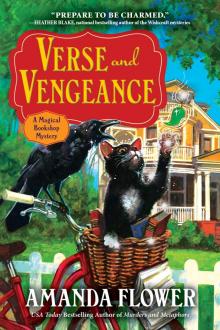 Verse and Vengeance
Verse and Vengeance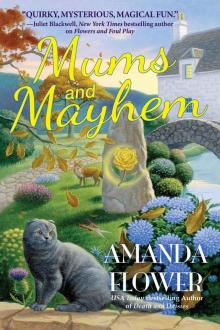 Mums and Mayhem
Mums and Mayhem Toxic Toffee
Toxic Toffee Criminally Cocoa
Criminally Cocoa Assaulted Caramel
Assaulted Caramel Maid of Murder aihm-1
Maid of Murder aihm-1 Murders and Metaphors
Murders and Metaphors Matchmaking Can Be Murder
Matchmaking Can Be Murder Maid of Murder (An India Hayes Mystery)
Maid of Murder (An India Hayes Mystery)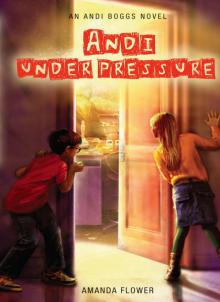 Andi Under Pressure
Andi Under Pressure Appleseed Creek Trilogy, Books 1-3
Appleseed Creek Trilogy, Books 1-3 A Plain Disappearance
A Plain Disappearance Andi Unstoppable
Andi Unstoppable The Final Vow
The Final Vow A Plain Malice: An Appleseed Creek Mystery (Appleseed Creek Mystery Series Book 4)
A Plain Malice: An Appleseed Creek Mystery (Appleseed Creek Mystery Series Book 4) The Final Tap
The Final Tap The Final Reveille: A Living History Museum Mystery
The Final Reveille: A Living History Museum Mystery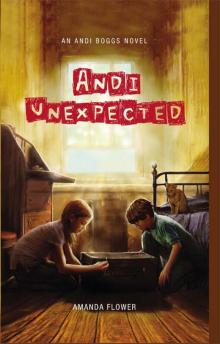 Andi Unexpected
Andi Unexpected Lethal Licorice
Lethal Licorice Premeditated Peppermint
Premeditated Peppermint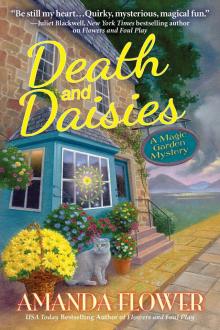 Death and Daisies
Death and Daisies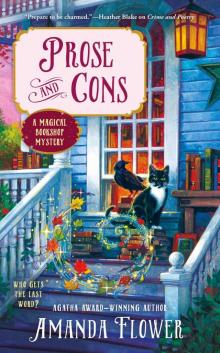 Prose and Cons
Prose and Cons